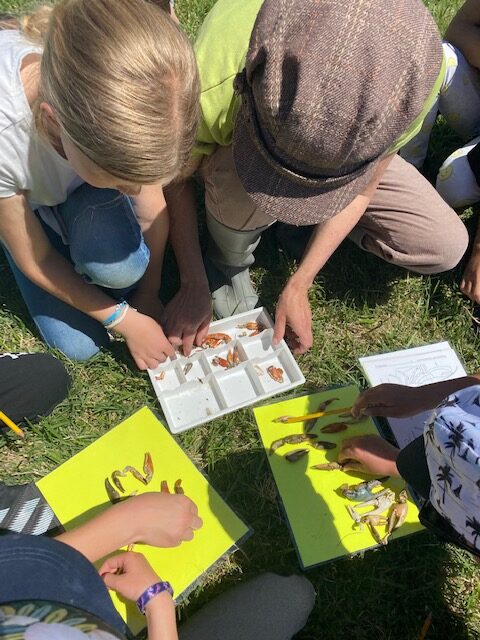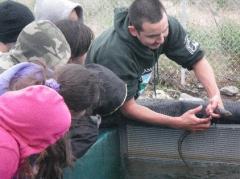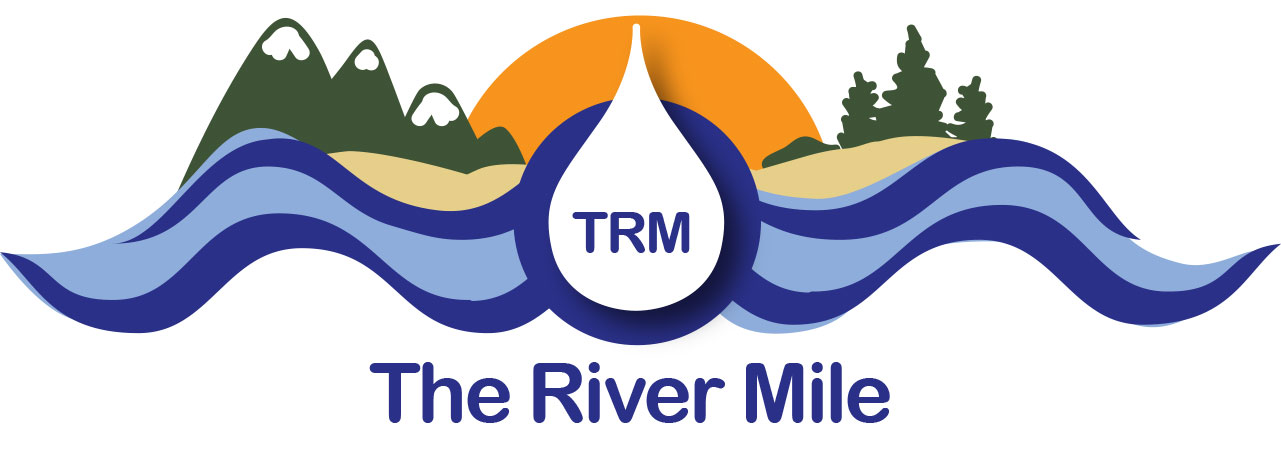Community Virtual Gatherings
2024 Community Gatherings • 4th Thursdays
3:30 to 4:30pm Pacific Time
The River Mile Network is pleased to announce the 2024 monthly speaker series! Check back as we will update the list of upcoming Gatherings regularly ~ and please do share with anyone you think might be interested.
Upcoming Community Gatherings
Thursday, January 25, 2024 from 3:30-4:30

Crayfish Study Group Presentations
“Charismatic Crustaceans: How The River Mile Crayfish Study supports and enhances REACH Museum’s place-based education”
Pauline Schaffer
REACH Education Manager Pauline Schafer shares the ways that crayfish have made the big topics of the Columbia River ecosystem and water quality accessible to a variety of learners. She will share specific ways her education team has used The River Mile’s Crayfish Study resources with preschoolers through adults.
Special Time Sensitive Presentation!
“World Fish Migration Day”
Steph Januchowski-Hartley
World Fish Migration Day is a global awareness campaign celebrated every two years, and in 2024 it is being celebrated on 25 May. The World Fish Migration Foundation is the main organizer of World Fish Migration Day in collaboration with individuals and groups who host events around the world on or before the World Fish Migration Day. Every World Fish Migration Day people highlight the connections that migratory fishes have with human and non-human species, lands, and waters. In this short presentation I will share about how the day is marked by celebrations, events, and action campaigns, and introduce several new initiatives for 2024, including the Happy Fish Athlete Challenge – a virtual challenge established for individuals and groups to go the distances that migratory fishes travel!

Select Past Community Gatherings
Pacific Lamprey Project
Journey with the Yakama Nation
Thursday January 26, 2023
3:30 to 4:30pm Pacific Time
Ralph Lampman, M.S., Pacific Lamprey Project Biologist, Yakama Nation

Yakama Nation is working to restore natural production of Pacific lamprey to a level that will provide robust species abundance, significant ecological contributions, and meaningful harvest within the Yakama Nations Ceded Lands and in the Usual and Accustomed areas. Come learn about this amazing species and the science that is helping it on its journey back to health.
Ralph Lampman holds a Masters Degree in Fisheries Science from Oregon State University and a Bachelors of Science from Humboldt State University. He previously served as a Fish Biologist for the Siuslaw National Forest (U.S. Forest Service), managing timber sale consultation, adult and juvenile salmonoids monitring, in stream and riparian restoration, and education outreach. His favorite quote is, “If there is a will, there is a way.”
Wednesday May 25, 2022
3:30 to 4:30pm Pacific Time
Incorporating Crayfish Into Siuslaw Watershed Council’s Elementary Education Programs
Tim Moffett, Education and Outreach Manager, Siuslaw Watershed Council
Tim Moffett, Education and Outreach Project Manager for Siuslaw Watershed Council, will detail how their organization incorporated crayfish studies into elementary education. Six classes, grades one through four, engaged in “riparian ecology” field trips at the BLM’s Whittaker Creek Recreation Site in Oregon’s Coast Range.
Wednesday April 27, 2022
3:30 to 4:30pm Pacific Time
Qapqápnim Wéele / Grande Ronde Community Science Project
Kayla Morinaga, Grande Ronde Model Watershed and Carrie Caselton Lowe, RedTwig Education
Kayla Morinaga from the Grande Ronde Model Watershed and Carrie Caselton Lowe from RedTwig Education, both from La Grande, Oregon, will present about the Qapqápnim Wéele / Grande Ronde Community Science Project and how they are incorporating The Crayfish Study into their work. The Qapqápnim Wéele / Grande Ronde Community Science Project is a participant driven science research program that engages youth in monitoring the Grande Ronde watershed and integrates Indigenous ways of knowing with Western science practices.
Wednesday February 23, 2022
3:30 to 4:30pm Pacific Time
Community Virtual Gathering ~ Invasive Crayfish Discoveries Around the Columbia River Watershed
Jamie Morton
Science Teacher, Lewiston High School and other members of The River Mile
Learn about exciting Crayfish Study discoveries happening around the Northwest. For instance, Jamie Morton will discuss her classes’ discovery of invasive red swamp crayfish near the Snake River in Lewiston, Idaho. This was the first known discovery of the species in the state, which was confirmed by DNA analysis from Dr. Eric Larson, who supervises the Study. Ms. Morton, Dr. Larson, Dr. Jim Ekins, and other members of The River Mile network are currently working on a research publication about the discovery and its implications.
Wednesday December 15, 2021 (note earlier week than usual)
3:30 to 4:30pm Pacific Time
How’s My Waterway: Exploring Your Local Waters
Kiki Schneider, IT Specialist at US Environmental
This session will focus on EPA’s newest water data tool called How’s My Waterway. This user-friendly app makes complex water data easily accessible to anyone. We encourage educators, the public and individuals working in the water sector to learn HMW so they can use it as a tool to help teach/assess water quality, restoration and environmental stewardship and make science based decisions.
Wednesday November 17, 2021
3:30 to 4:30pm Pacific Time
Agonistic Behavior Between the Native Pilose and Non-Native Virile Crayfishes
Doreen Cabrera, PhD Candidate at Brigham Young University
Pilose crayfish (Pacifastacus gambelii) are endemic to the western United States, however, this little-known species is facing threats by the non-native virile crayfish (Faxonius virilis). We sought to study the competitive interaction between these crayfish to understand whether virile crayfish have an aggressive advantage over pilose crayfish and thus leading to their displacement. The program will conclude with a Q&A.
Wednesday October 27, 2021
3:30 to 4:30pm Pacific Time
Introduction to The River Mile Network
Janice Elvidge, Executive Director & Founder of The River Mile Network
Wednesday September 22, 2021
3:30 to 4:30pm Pacific Time
Conservation of North American Crayfishes
Christopher A. Taylor PhD, Lead Scientist and Curator of Crustaceans, University of Illinois
The North American crayfish fauna is the richest in the World. When coupled with their significant ecosystem impacts, the conservation of this unique fauna should be of upmost importance.
Wednesday May 26, 2021
3:30 to 4:30pm Pacific Time
Rogue Detection Teams
Suzie Marlow, Co-Founder, Education & Marketing
Rogue Detection Teams provide detection dog teams to seek odors for the conservation field. This includes live animals, nests, scats, diseases, and invasive plants, be this in the desert, the forest, or even on the water. We do more than fieldwork, too! We assist in study design, offer program development, provide detection dog classes, and develop resources and detection teams for education outreach!
The program will conclude with a Q&A.
Wednesday April 28, 2021
3:30 to 4:30pm Pacific Time
The Path to Lake Roosevelt: From Forest to Park
Karen Honeycutt and Cassandra Hageman
Karen Honeycutt is the Natural Resource Program Manager with the US Forest Service, Colville National Forest, and Cassandra Hagemann is the Aquatic Invasive Species Ranger with the National Park Service, Lake Roosevelt National Recreation Area.
Presenters will explore how the water moves from the headwaters of the Pend Oreille River on the Colville National Forest to the Columbia River that fills Lake Roosevelt and the partnership between the US Forest Service and the National Park Service. It will begin with Where the headwaters are and what feeds the river and then continute the exploration of the water’s path, animals usage of the river in the National Forest and opportunities it provides. (Boundary Dam, recreation, etc.), native aquatic life found on the Pend Oreille River, invasive aquatic life found in Lake Roosevelt, history of Grand Coulee Dam, and how the water in Lake Roosevelt is used (Recreational opportunities, etc.).
The program will conclude with a Q&A.
Wednesday March 24, 2021
3:30 to 4:30pm Pacific Time
From Fires to Fishable: The U.S. Federal Clean Water Act
Dr. Jim Ekins, Area Water Educator, University of Idaho Extension
The Clean Water Act of 1972 is one of the cornerstone environmental protection laws in the United States. It resulted in profound water quality improvements throughout the country. With some amendments along the way, it stood the test of time as a well written, robust piece of legislation. But where did it get it’s start? How is it organized? How is it implemented today? And what emerging challenges to the law should we be aware of? Let’s explore the Federal Water Pollution Control Act Amendments of 1972, and as it’s formally known, in this 40-minute presentation by a guy who was two years old when it passed, Jim Ekins, Ph.D., Area Water Educator for University of Idaho Extension.
Wednesday February 24, 2021
3:30 to 4:30pm Pacific Time
The Weird, Hairy Crayfishes of the Pacific Northwest
Dr. Eric Larson, University of Illinois
An overview of the ecology and conservation of the pilose crayfishes Pacifastacus connectens and Pacifastacus gambelii. If you’ve encountered a crayfish in the Pacific Northwest, odds are that it was either our native, iconic signal crayfish (Pacifastacus leniusculus) or one of a number of non-native species introduced from eastern North America. However, the region is home to other, rarer native species, including the two species of pilose or “hairy” crayfishes: Pacifastacus connectens and Pacifastacus gambelii. Long under-studied, my laboratory has been conducting research on the ecology, distribution, evolution, and conservation status of these unusual animals across Oregon, Idaho, Wyoming, Nevada and Utah. Here I’ll summarize our current understanding of two of the region’s most poorly known freshwater species.
January 27, 2021
3:30 to 4:30pm Pacific Time
Crayfish as Environmental Indicator Species: A Big Treasure in a Small Package
Dr. Alan Kolok, Idaho Water Resource Research Institute
The River Mile has been collecting crayfish, both native and invasive, from Washington and Oregon over the last 10 years. Because of their undesirability, the invasives that have been collected by The River Mile have been discarded rather than put back into the environment. But did you know that these animals actually possess a treasure trove of environmental information as they accumulate chemicals from the environment in their tissues that can be used in environmental monitoring? In this talk we will talk about why crayfish accumulate chemicals in their tissues and the different types of chemicals you can and cannot find in their tissues.

